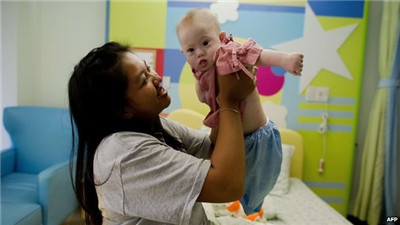Nicola Scott, a lawyer with UK family law firm Natalie Gamble Associates, says that about 25% of her firm's clients go to the US, often because they feel it is safer.
尼古拉·斯科特,一名英國家庭法律事務(wù)所--娜塔莉·甘布爾合伙(事務(wù)所)的律師,說到:她所里的客戶大約有25%前往美國,常因?yàn)樗麄冇X得那里更安全。
"The US has a very long history of surrogacy. One reason is that the parents know there are established frameworks in many states, particularly California, so there is safety associated with going there," she says.
“美國在代孕方面有很長的歷史。其中一個原因是父母知道在許多州已經(jīng)形成了框架,特別是加州,所以去那有更多的安全保障。”她說。
Why do women become surrogate mothers? Sarah Wisniewski, Surrogacy UK
為什么女性會成為代孕母親?莎拉·維希涅夫斯基,英國的代孕母親
We're aware of how, just taking a year out of our lives can drastically help someone else's life.
我們意識到,僅僅用掉我們生命中的一年將會如何猛烈的幫助他人的人生。
The majority of us have our own children, although a couple of the surrogate mothers in our network are childless.
我們中的大多數(shù)都擁有自己的孩子,雖然有兩三個代孕母親在我們的網(wǎng)絡(luò)中是無子的。
We appreciate and are grateful for our own children too - the majority of us just see pregnancy as something we find very easy - something we can do while getting on with our everyday lives.
我們同樣對我們自己的孩子重視并心存感激——我們中的大多數(shù)僅僅把懷孕看做很舒適/簡單的事——那種可以一邊做、一邊過好每一天的事情。
"People who choose other destinations tend to do so because a surrogacy there typically costs a lot less than in the US."
“使人們選擇其他目的國的主要原因,是那里的花費(fèi)要遠(yuǎn)遠(yuǎn)少于美國。”
In many countries, "surrogacy isn't illegal, but there's no framework to support it," Ms Scott says.
在許多國家,“代孕并不是違法的,但是那里也沒有(法律)框架來支持代孕。”斯科特女士說。
For example, Thailand does not have clear regulations surrounding surrogacy. However, legislation has been drafted to regulate surrogacy, and authorities now say the surrogates must be a blood relative of the intended parents.
舉例來說,泰國沒有明確的規(guī)范化代孕的周邊環(huán)境。然而,規(guī)范代孕的立法已經(jīng)被起草,并且當(dāng)局現(xiàn)在聲明代孕婦必須是【預(yù)定父母】(intended parents)的血親。
Similarly, India is considering legislation which could "massively restrict surrogacy", Ms Scott says, and will "shut the door to singles and gay couples".
同樣的,印度正在考慮進(jìn)行的的立法或?qū)ⅰ按笠?guī)模的限制代孕”,斯科特女士說,并將“對單身或同性夫婦關(guān)上大門”。
What are the complications?
還有什么復(fù)雜的因素?
There are no internationally recognised laws for surrogacy, so many parents and children can be left vulnerable - or even stateless.
沒有國際公認(rèn)的代孕法律,如此多的父母和孩子將變得弱勢/易受傷害——甚至無國籍。
It can take several months to bring a surrogate baby back to the parents' home country, as they may not be automatically recognised as the legal parents.
將代孕寶寶帶回其父母的國家會花費(fèi)數(shù)月之久,他們或許不會自動被承認(rèn)為(代孕寶寶的)合法父母。
"In Thailand, surrogates are seen as the legal mother, so if the parents leave the baby with the mother, she is legally responsible. This is one of the difficulties seen in the Gammy case," Ms Scott says.
“在泰國,代孕婦被視為合法母親,所以如果父母將孩子留給代孕母親,她將負(fù)有(撫養(yǎng)孩子的)法律責(zé)任,這正是我們在Gammy案例中看到的難點(diǎn)之一。”斯科特女士說。
"In India, the intended parents are seen as the legal parents," whereas under UK law, the surrogate mother is recognised as the legal mother.
“在印度,【預(yù)定父母】(intended parents)被視為合法父母,”而在英國法律下,代孕母親被承認(rèn)為合法母親。

The case of Gammy (right) who was born to a surrogate mother, has caused controversy in Australia and Thailand
Gammy的案例(右),由代孕母親所生,已經(jīng)引起了澳大利亞與泰國的爭論。
"This means a surrogate baby born in India, for UK parents, is born stateless, and has to apply for British citizenship."
“這意味著一個生于印度的代孕寶寶,對于寶寶的英國父母來說,是無國籍的,并且不得不申請英國國籍。”











